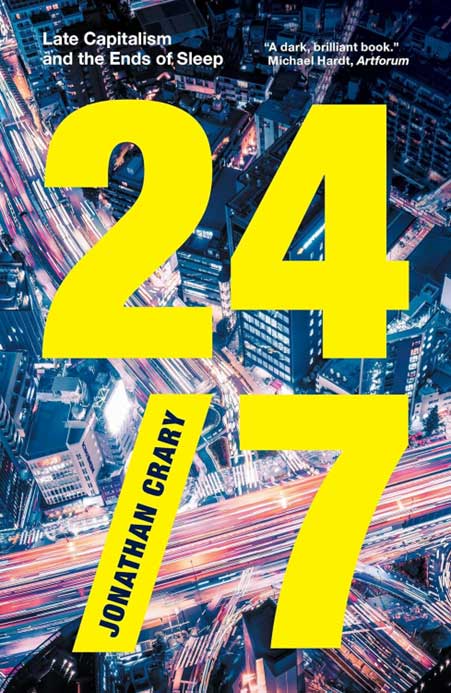
24/7, Jonathan Crary, 133 pages, Verso, £9.99
This is a timely re-issue of a 2013 book about the rise of consumption culture and its effect on society, mostly through the rise of interactive technology and its place within how we live. Although it is rather dramatically subtitled “Late Capitalism and the Ends of Sleep” it isn’t really about that, nor – thankfully – does it engage with paranoid conspiracies or scientifically impossible theories (unlike some of the regulars here at the IT website).
What Crary carefully documents and evidences is how all-day-every-day online access to shopping, news, comment and (dis)information has resulted in a generation (at least), perhaps even a global population of people, who have difficulty with social interaction in person, often wear the same or similar things, aspire to the same status and income, and are constantly fed material that reinforces what Crary calls “a logic of greed, accumulation, and environmental despoliation”. This results in what Professor Bernard Stiegler – paraphrased by Crary – regards as “the homogenisation of perceptual experience within contemporary culture”, that is we all end up experiencing (seeing, watching, looking at, reading, talking about) the same things, resulting in “a ‘mass synchronization’ of consciousness and memory.”
It is not hypnosis, alien indoctrination or 5G microwaves, let alone the replacement of ethnic groups of populations, it is neoliberal science: monitoring, persuasion and algorithms means “we have become the innocuous, pliable inhabitants of global urban societies.” The sad thing is that we are complicit in this and that there is no easy way to remove ourselves from this situation, since everything – from shop tills to cash machines via surveillance cameras, not to mention our online browsing and TV watching – reinforces our taste and consumption in endless feedback loops of advertising, desire and tailored news and “suggestions” (“You liked this so you might like this”).
Crary is in many ways despairing and negative, suggesting that “We are the compliant subject who submits to all manner of biometric and surveillance intrusion, and who ingests toxic food and water and lives near nuclear reactors without complaint.” All of us, he argues, are party to “The absolute abdication of responsibility for living”, preferring instead to believe and partake in “24/7 capitalism [where] a sociality outside of individual self-interest becomes inexorably depleted, and the interhuman basis of public space is made irrelevant one’s fantasmatic digital insularity.”
Although this insularity perhaps started with television, or possibly radio, the current rise of Artificial Intelligence – however unintelligent and uncreative it most certainly is – means more people work from home, or are unemployed, and that society is even more dependent on streamlined digital interfaces. We go out less, see less people, watch more TV, read summaries or targeted news online, are less creative people, more subservient and susceptible.
Crace explores some examples of books and visual art to discuss creativity and active imaginations, arguing that we should resist “reconceiv[ing] all facets of individual experience as continuous and compatible with the requirements of accelerated 24/7 consumerism.” We are, he says, individuals with our own dreams, desires and lived experience and should resist the “overarching prohibition on wishes other than those linked to individual acquisition, accumulation and power.”
It is here, late on in the book, that Crace looks to rekindle “sustained counter-action and obliteration over the long term”, highlighting “the collective and individual understanding, arrived at in the 1960s through direct experiences, that happiness could be unrelated to ownership, to acquiring products, or to individual status, and could instead emerge directly out of the shared life and action of groups.” He quotes Gary Snyder: “True affluence is not needing any thing”, and notes that even simple actions such as “new forms of association” and “affronts to the sanctity or private property” are threatening to power.
These threats must, says Crace, happen in person and offline, as “Any social turbulence whose primary sources are in the use of social media [and by implication online] will inevitably be historically ephemeral and inconsequential.” Much more important, Crace reminds us, are what the social philosopher George Herbert Read called “the constitutional elements of human society”, which he claimed were “neighborliness, helpfulness, and cooperation.” Read stated that “The fundamental attitude of helping the other person who is down, who finds himself in sickness or other misfortune, belongs to the very structure of individuals in a human community”, and went as far as to argue that, “for thousands of years these values were also the basis of economic exchange”, where ideas of need and participation were prioritised above profit.
It may seem somewhat idealistic and naive, but Crace is convinced that sleep is one of the few individual and personal parts of our lives not totally directed or infiltrated by neoliberal capitalism. Only “the restorative inertness of sleep counters the deathliness of all the accumulation, financialization, and waste that have devastated anything once held in common.” By dreaming of resistance and possibility, and then acting on those dreams, we can perhaps make possible “a future without capitalism”.
.
Jonathan Sinclair
.
